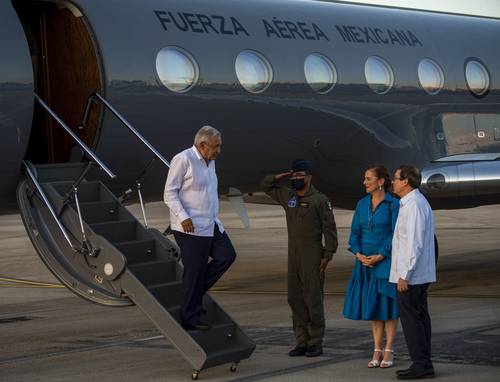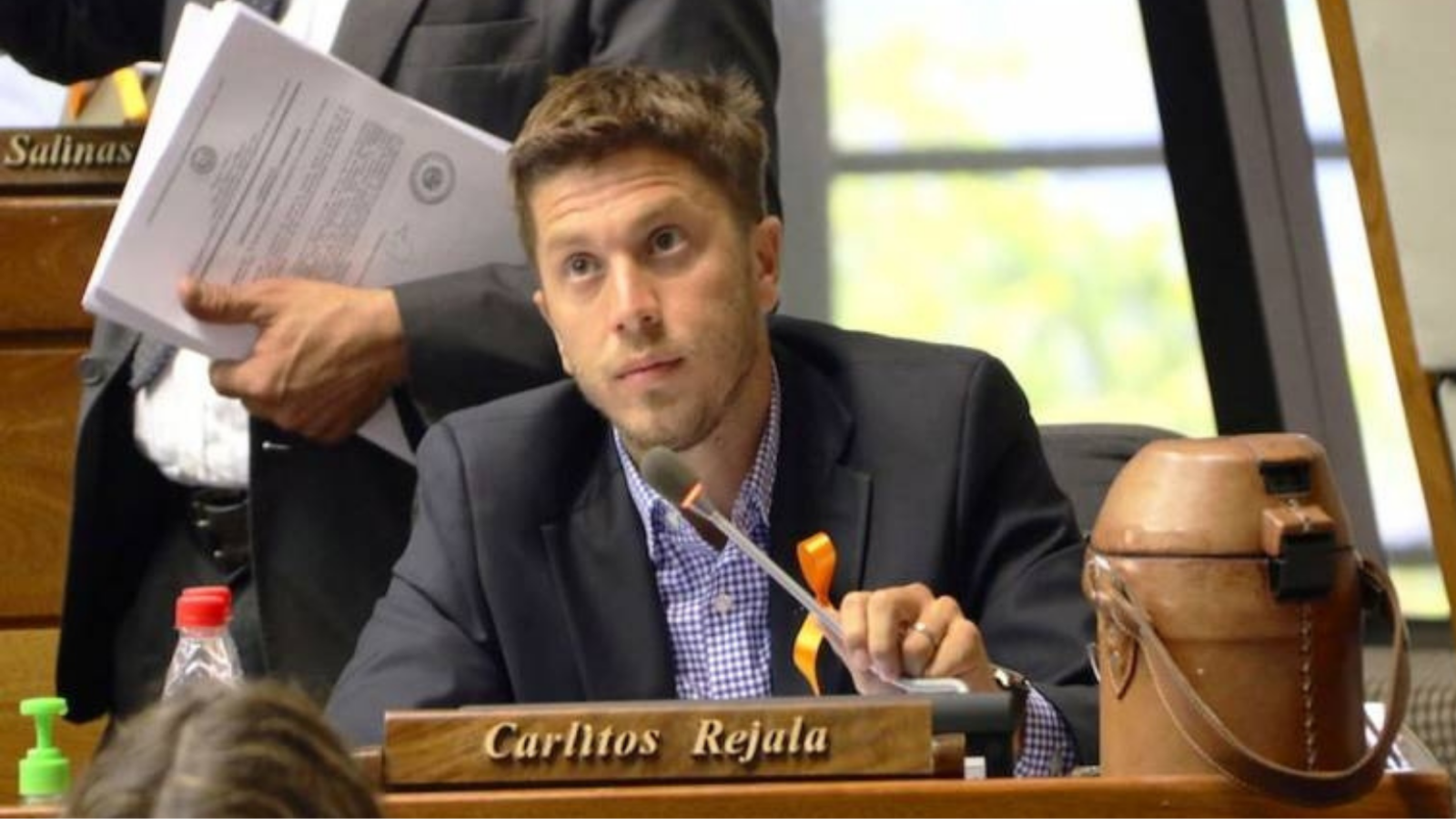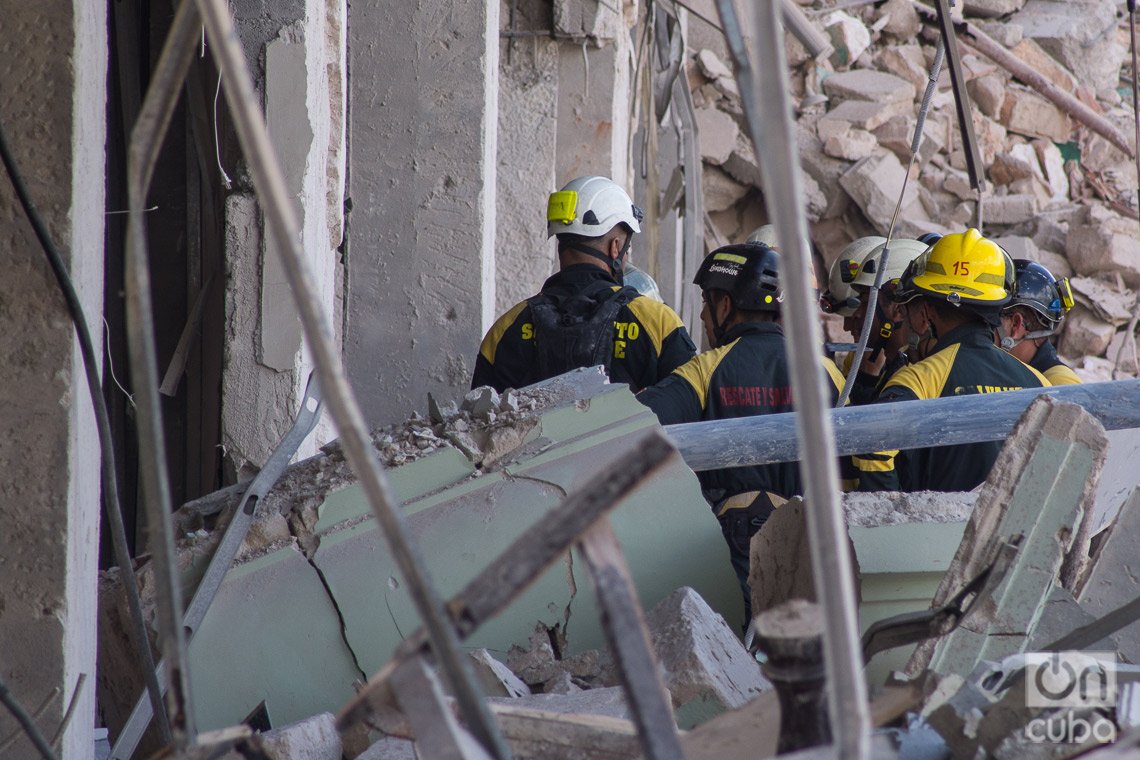▲ Foreign Minister Bruno Rodríguez officially welcomed the Mexican president and his wife yesterday in Havana.Photo App
Alonso Urrutia
Send
Newspaper La Jornada
Sunday May 8, 2022, p. 4
Havana. Last night, President Andrés Manuel López Obrador arrived in Cuba for an official visit. It is the last point of his tour of Central America and this island. His presence in Havana demonstrates the new stage in bilateral relations inaugurated in 2018 after the ups and downs that occurred during the so-called neoliberal period, as the president himself defines the almost four decades prior to his arrival in power.
At 7:27 p.m., the Mexican Air Force aircraft arrived carrying the Mexican president accompanied by his wife and the Secretary of Foreign Affairs, Marcelo Ebrard. Cuban Foreign Minister Bruno Rodríguez was already waiting for him on the track, who gave him an official welcome. Shortly after, the Ceremonial Band of the Cuban Revolutionary Armed Forces performed a musical piece in honor of López Obrador as part of a formal reception that lasted no more than ten minutes.
Through his social networks, the president of Cuba, Miguel Díaz-Canel, welcomed his counterpart: “Welcome to #Cuba, dear president @lopezobrador. Your visit will strengthen the bonds of friendship between our countries, which are already endearing because they overcome time and challenges to settle in the soul of our peoples. #3Cuba and Mexico, #Amlo in Cuba”.
López Obrador’s agenda for this Sunday will be intense, highlighting a private meeting with Cuban President Miguel Díaz-Canel, who will deliver the José Martí Order to the President of Mexico. The signing of an agreement between the secretariat and the Ministry of Health of both countries and the floral offering at the monument to José Martí, in the Plaza de la Revolución, were included in the agenda.
Historical and emblematic relationship that in the last six-year terms oscillated between protocol approaches and diplomatic episodes that led to estrangement, particularly under the PAN governments. The arrival of López Obrador to the government opened the door to restore diplomatic ties, friendship and cooperation between both nations, and this Sunday they will be endorsed with the Mexican president in Havana.
Accompanied by his wife, Beatriz Gutiérrez Müller, as well as the Secretaries of Foreign Affairs, Marcelo Ebrard; of the National Defense, Luis Cresencio Sandoval, and of the Navy, José Rafael Ojeda, the president will meet privately around noon with his Cuban counterpart Miguel Díaz-Canel and, later, there will be an extended meeting with the delegations of both governments.
It will be the third meeting of both leaders after the pair of visits by Díaz-Canel to Mexico in October 2019 and in September 2021. In the latter, López Obrador had the deference to the Cuban president to invite him to speak in the capital’s Zócalo during the commemoration of national independence.
On that occasion, and as he says on every occasion, López Obrador condemned in his speech the historic actions against Cuba and called respectfully to the United States government to lift the blockade, because no State has the right to subjugate another; if it were to succeed, it would become a vile, pyrrhic, rogue triumph, though that seems unlikely
.
This unusual celebration of Independence even sparked a controversy with former President Felipe Calderón, who questioned the decision. And the irony of López Obrador was immediate: Well, it’s good that you don’t like it, it was masks!
.
It must be remembered that in 2017, the island government denied entry to the passenger Felipe Calderon
, as the former president himself tweeted at the time. And the Ministry of Foreign Affairs was explicit in describing as a provocation and an attempt to damage the international image of Cuba in a meeting called to commemorate Cuban dissident Oswaldo Payá
reason for the former president’s visit.
Zedillo: the beginning of a stage of surprises
Since the triumph of the Revolution, the PRI governments have maintained close ties with Fidel Castro’s Cuba. That link, however, began to take a turn with the government of Ernesto Zedillo Ponce de León.
The good relations that prevailed between the two nations at the beginning of Zedillo’s six-year term (1994-2000) gradually changed in the face of his government’s positions regarding Cuba and, in the twilight of the administration, reached levels that bordered on confrontation.
Thus, a strong speech by Castro regarding Mexico’s growing closeness to the United States after the signing of the trade agreement even motivated the Mexican Foreign Ministry to express its surprise and call the then Cuban ambassador to Mexico to express disagreement.
In turn, and at the beginning of his administration, Vicente Fox, a PAN member, tried to put that dispute behind him and paid a visit to Havana, where he received deferential treatment from Castro. But it would only be a short-lived reconciliation, because the most scandalous episode between the two governments followed (2002) in the context of the United Nations Summit on Financing for Development, in Monterrey.
Fox’s express request for Castro to withdraw from the country before the arrival of the meeting with the president of the United States, George Bush, known for broadcasting the audio of the conversation, precipitated a crisis in the relationship. And the differences deepened with the positions assumed by Mexico towards Cuba in various international forums.
Critic of the human rights situation on the island already as a former president, Felipe Calderón (2006-2012) opted to relax the then battered diplomatic relations and even, almost at the end of his term, visited Cuba.
A similar position would continue his successor, the PRI Enrique Peña Nieto. During the celebration in 2014 of the II Summit of the Community of Latin American and Caribbean States (CELAC) –created at the impulse of the Venezuelan leader Hugo Chávez–, he also made an official visit that included a meeting with Fidel Castro, then already separated from life public.
Two years later, during the leader’s funeral and before a crowded Plaza de la Revolución and dozens of international leaders, Peña Nieto defined Castro as the builder of revolutionary Cuba; but, even more, he was one of the emblematic figures of the second half of the 20th century
.
In this period, beyond the high-level approaches, public speeches and private meetings, in fact, the solidarity between the two nations had its greatest expressions during the pandemic.
To the presence of Cuban doctors in Mexico, in the midst of the escalation of the first wave of covid in Mexico, our country responded some time later by sending two ships to Cuba with medicines and food products.
This Sunday, with the visit of López Obrador, there will be a new episode in relations.








